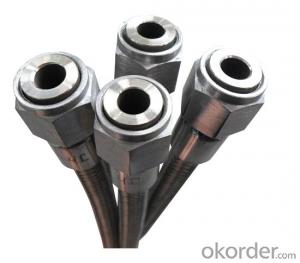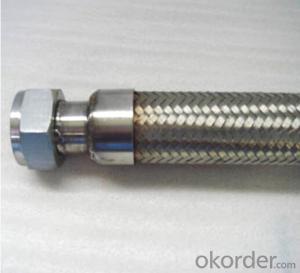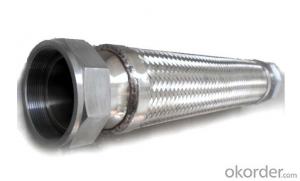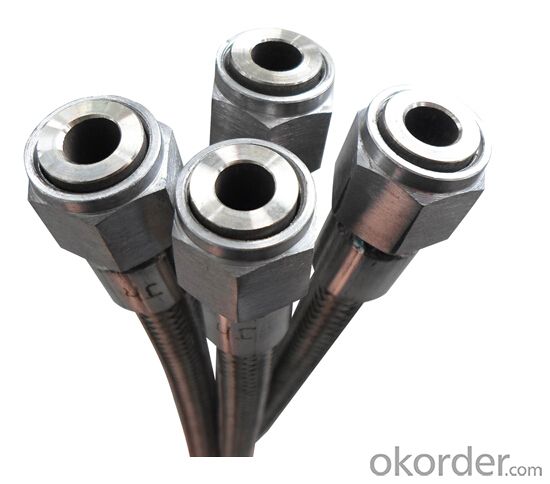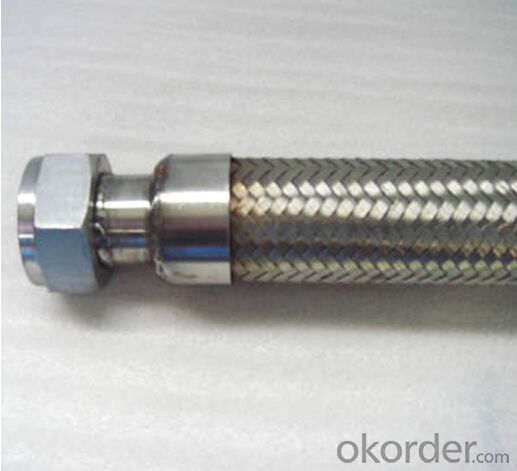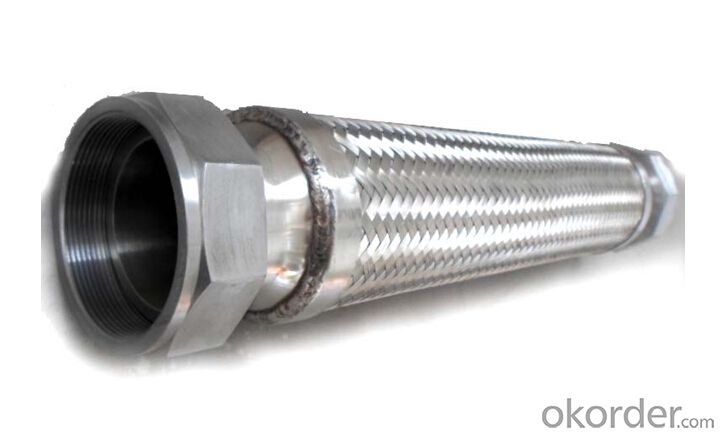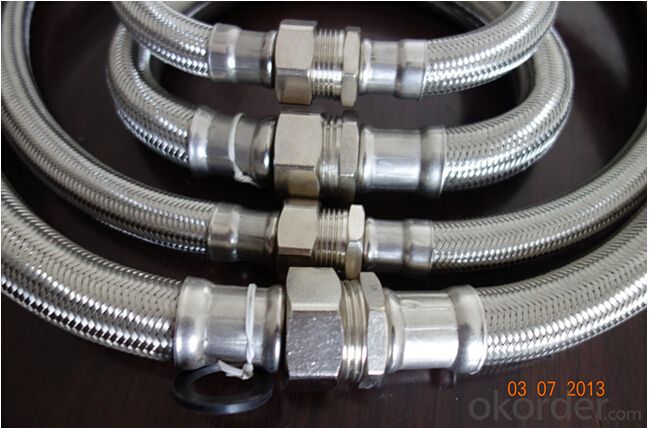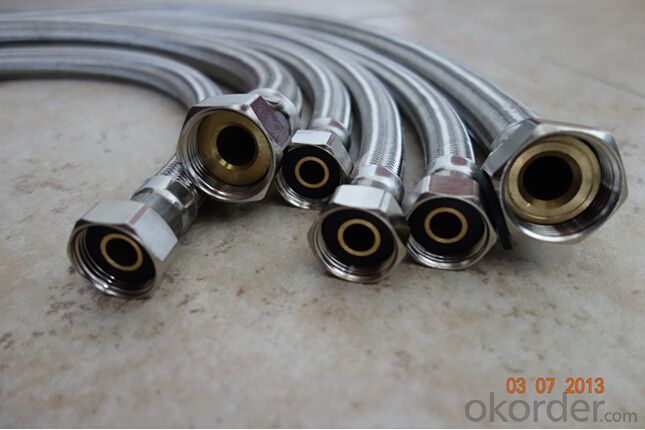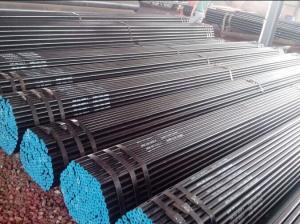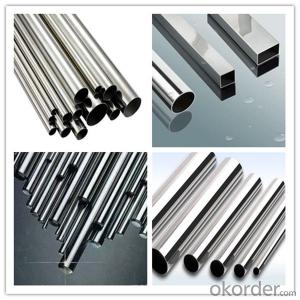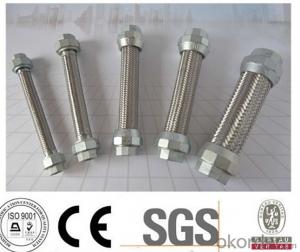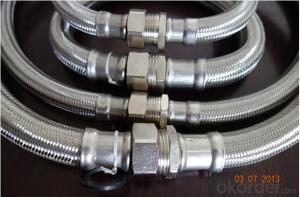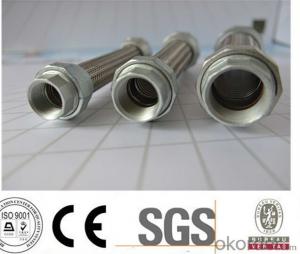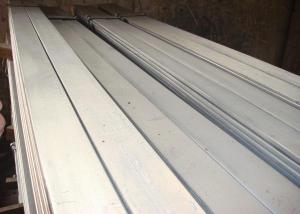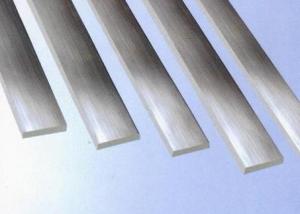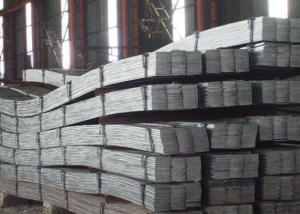Stainless Steel Braid Hose for Special Equipment
- Loading Port:
- Tianjin
- Payment Terms:
- TT OR LC
- Min Order Qty:
- 1000 pc
- Supply Capability:
- 100000 pc/month
OKorder Service Pledge
OKorder Financial Service
You Might Also Like
Specification
Stainless Steel Braid Hose for Special Equipment
Applications of Stainless Steel Braid Hose for Special Equipment:
--Refueling system
--Chemical and pharmaceutical industry
--Industrial hydraulic systems
--Air conditioners in industrial and construction –site vehicles
--Food and beverage industry
--Special and standard industrial applications
--Water and cleaning management
Features of Stainless Steel Braid Hose for Special Equipment:
1. )O. D.: 13-18MM 0.2-3M long
2. )Nut.: Nickel/Chrome Plated Brass (Zinc / Iron / Aluminum is available)
3. )Size Of Nut.: Female&Male 1/2''; 3/4''; 3/8''; 7/8''; 5/16'', and M10...
4. )Insert.: Brass (Zinc / Aluminum / Plastic is available)
5. )Inner tube.: Rubber/ EPDM/PVC
6. )Covered Material: Stainless Steel 201, 301, 304 /Aluminium Wire
7. )Working Pressure: 5Kg-15Kg
8. )Temperature: 0-92° C
9. )Quality Assurance: 3 years
RemarkAPPLICATION: HOUSEEHOLD WARE, BATHROOM WARE, SHOWER HOSE
PAYMENT: T/T, L/C
DELIVERY TIME: 20DAYS OR 30DAYS AFTER RECEIVED 30% DEPOSITS
MOQ: 5000PCS
ODM&OEM IS ACCEPTABLE
PackageInner: PP bag /Blister packing Outer: Carton box
Specifications of Stainless Steel Braid Hose for Special Equipment:
NO | I.D | Refer to O.D | Working pressure | Burst pressure | approximate Weight | |||||
(inch) | (mm) | (inch) | (mm) | MPa | Psi | MPa | Psi | kg/m | lbs/ft | |
1 | 1/8 | 3.2±0.2 | 0.35 | 9±0.3 | 2.06 | 300 | 8.27 | 1200 | 0.078 | 0.12 |
2 | 5/32 | 4±0.2 | 0.4 | 10±0.3 | 2.06 | 300 | 8.27 | 1200 | 0.092 | 0.14 |
3 | 3/16 | 4.8±0.2 | 0.43 | 11±0.3 | 2.06 | 300 | 8.27 | 1200 | 0.108 | 0.16 |
4 | 1/4 | 6.3±0.3 | 0.5 | 12.7±0.3 | 2.06 | 300 | 8.27 | 1200 | 0.134 | 0.2 |
5 | 5/16 | 8.0±0.3 | 0.56 | 14±0.3 | 2.06 | 300 | 8.27 | 1200 | 0.147 | 0.22 |
6 | 3/8 | 9.5±0.3 | 0.63 | 16±0.4 | 2.06 | 300 | 8.27 | 1200 | 0.182 | 0.27 |
7 | 15/32 | 12±0.3 | 0.75 | 19±0.5 | 2.06 | 300 | 8.27 | 1200 | 0.238 | 0.35 |
8 | 1/2 | 12.7±0.4 | 0.78 | 20±0.5 | 2.06 | 300 | 8.27 | 1200 | 0.262 | 0.39 |
9 | 5/8 | 16±0.4 | 0.94 | 24±0.5 | 1.03 | 150 | 4.12 | 600 | 0.351 | 0.52 |
10 | 3/4 | 19±0.4 | 1.13 | 28.8±0.5 | 1.03 | 150 | 4.12 | 600 | 0.515 | 0.77 |
11 | 1 | 25.4±0.5 | 1.38 | 35±0.6 | 1.03 | 150 | 4.12 | 600 | 0.637 | 0.95 |
Images of Stainless Steel Braid Hose for Special Equipment:
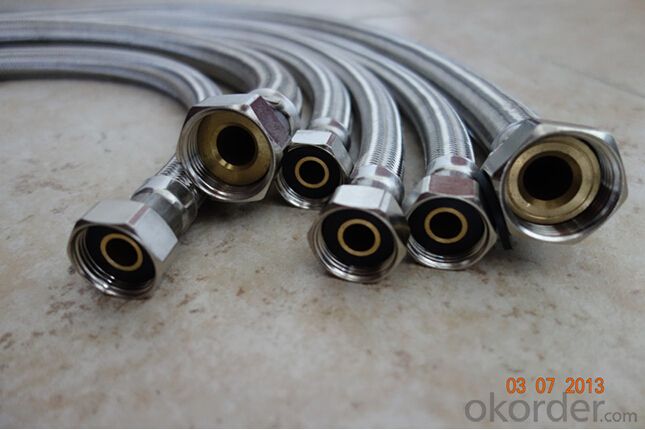
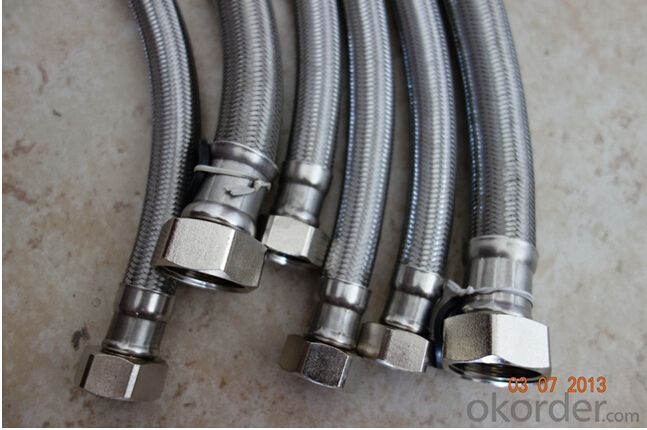
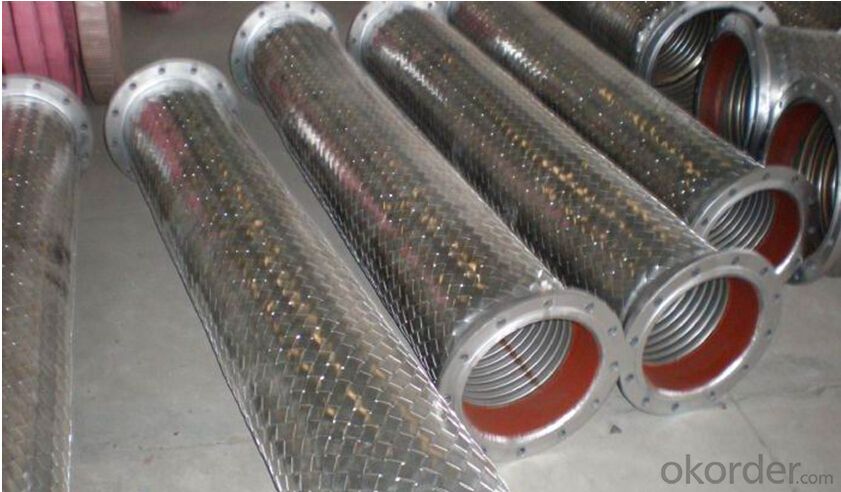
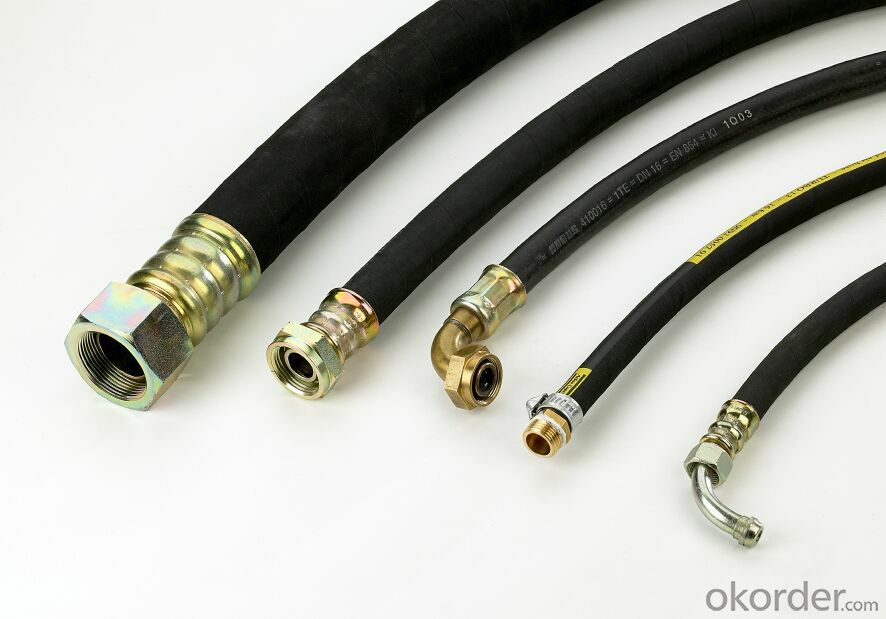
Package of Stainless Steel Braid Hose for Special Equipment:
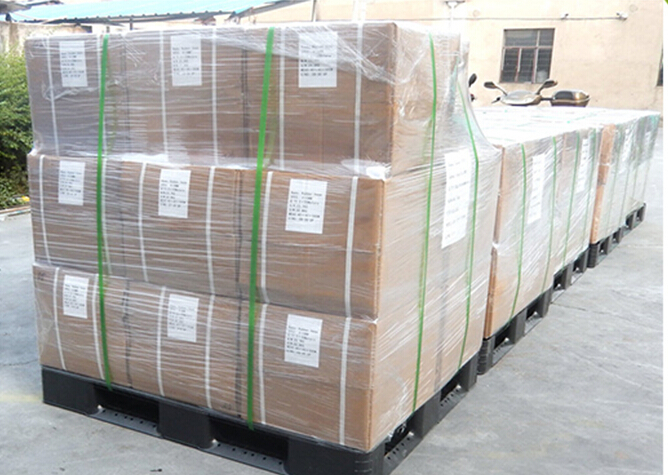
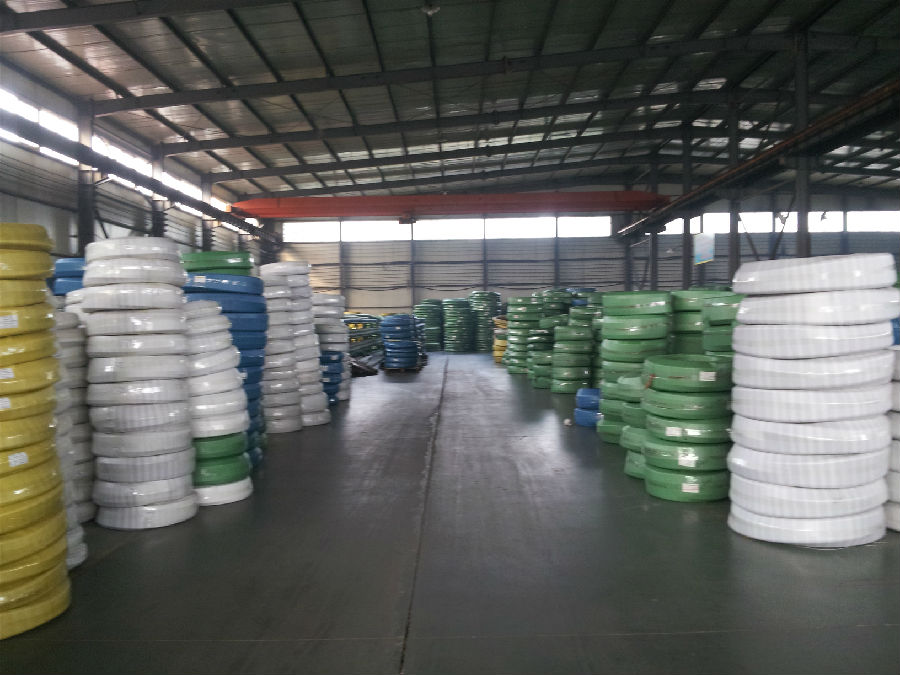
FAQ of Stainless Steel Braid Hose for Special Equipment:
Who we are:
Answer: We CNBM is a Chinese state-owned enterprise ranked 267th among the Global Fortune 500, as the largest building materials company,we have over 300 affiliated companies,and so many production lines and branch office distribute in China.
2. About our quality:
Answer: Every product needs to be quality proved before shipping.
3. About our service:
Answer: We could gurantte that we can reply you in 2 working hours.
- Q: Can stainless steel pipes be coated with PTFE?
- PTFE, also known as polytetrafluoroethylene, can be applied as a coating on stainless steel pipes. This material is highly stable and unreactive, boasting exceptional resistance to chemicals, low friction, and high temperatures. Coating stainless steel pipes with PTFE yields numerous advantages, including reducing friction, preventing corrosion, and enhancing chemical resistance. The PTFE coating creates a smooth surface that is non-stick, facilitating better liquid flow and deterring deposits on the pipe walls. Industries such as chemical processing, food and beverage, pharmaceuticals, and oil and gas benefit greatly from this application, as their pipes are often exposed to aggressive chemicals or high temperatures. Additionally, the PTFE coating offers electrical insulation properties, making it suitable for specific purposes. Ultimately, applying PTFE coating to stainless steel pipes elevates their performance and prolongs their lifespan in various industrial settings.
- Q: Can stainless steel pipes be used for pulp and paper mills?
- Yes, stainless steel pipes can be used for pulp and paper mills. Stainless steel is highly resistant to corrosion and can withstand the harsh chemicals and high temperatures commonly found in pulp and paper mills. Additionally, stainless steel is durable and long-lasting, making it a suitable choice for such industrial applications.
- Q: Can stainless steel pipes be used for wastewater pumping stations?
- Yes, stainless steel pipes can be used for wastewater pumping stations. Stainless steel is a highly durable and corrosion-resistant material, making it suitable for applications involving wastewater transportation. It can withstand the harsh and corrosive environment of wastewater pumping stations, ensuring long-term reliability and minimal maintenance requirements. Additionally, stainless steel pipes have excellent mechanical properties, making them capable of withstanding the high pressures and temperature variations commonly encountered in wastewater pumping systems.
- Q: Are stainless steel pipes suitable for underground applications?
- Indeed, underground applications are well-suited for the utilization of stainless steel pipes. Renowned for its remarkable resistance to corrosion, stainless steel proves to be an exceptional selection for installations that are situated beneath the surface, where pipes are regularly exposed to moisture, soil, and other detrimental elements. Its ability to endure harsh environments while maintaining its structural integrity over time is truly impressive. Moreover, stainless steel pipes possess superior strength and durability, enabling them to withstand the immense pressure and stress associated with being buried underground. Furthermore, the non-reactive nature of stainless steel ensures that the water or fluid flowing through these pipes remains uncontaminated. Overall, stainless steel pipes can be relied upon as a dependable and long-lasting solution for underground applications.
- Q: What is the average lead time for manufacturing stainless steel pipes?
- The average lead time for manufacturing stainless steel pipes can vary depending on several factors such as the complexity of the design, quantity required, and the manufacturer's production capacity. However, on average, it can range from a few weeks to a couple of months.
- Q: What is the maximum temperature stainless steel pipes can withstand?
- The specific grade of stainless steel used determines the maximum temperature that stainless steel pipes can tolerate. Typically, these pipes can withstand high temperatures between 1200°C and 1400°C (2200°F to 2550°F). However, it's essential to consider that the actual maximum temperature may differ due to factors like the stainless steel composition, the duration of exposure to high temperatures, and the presence of corrosive elements in the surroundings. To obtain precise temperature limits for a specific grade of stainless steel pipe, it is always advised to refer to the manufacturer's specifications or seek guidance from a professional engineer.
- Q: Are stainless steel pipes suitable for oil refineries?
- Stainless steel pipes, known for their high resistance to corrosion, prove to be a suitable choice for oil refineries. This is particularly important in environments abundant with corrosive substances like crude oil and various chemicals involved in refining procedures. Moreover, stainless steel pipes possess the ability to withstand both high temperatures and pressures, thus making them the perfect means for transporting oil and gas within the refinery. In addition to this, the low maintenance requirements and long lifespan of stainless steel pipes reduce the frequency of replacements, resulting in minimal downtime. In conclusion, stainless steel pipes offer the durability, reliability, and corrosion resistance necessary to meet the demanding conditions of oil refineries.
- Q: What is the difference between 304J4 and 316J4 stainless steel pipes?
- 304J4 and 316J4 stainless steel pipes exhibit contrasting compositions and properties. In terms of their alloy content, 304J4 stainless steel comprises 18-20% chromium and 8-10% nickel, whereas 316J4 stainless steel consists of 16-18% chromium, 10-14% nickel, and 2-3% molybdenum. The elevated levels of nickel and molybdenum in 316J4 stainless steel pipes contribute to their superior resistance against corrosion compared to 304J4 stainless steel pipes. This characteristic renders 316J4 stainless steel pipes more suitable for applications exposed to harsh environments, including marine and chemical industries. Moreover, the increased molybdenum content in 316J4 stainless steel pipes enhances their ability to withstand pitting and crevice corrosion, which commonly occur in chloride-rich surroundings. Consequently, they are the preferred choice for applications involving exposure to seawater or other corrosive substances. Conversely, 304J4 stainless steel pipes offer a more cost-effective option and are frequently employed in less demanding applications, where corrosion resistance is not a primary concern. They find wide usage in industries such as food processing, appliances, and automotive. In conclusion, the fundamental disparities between 304J4 and 316J4 stainless steel pipes lie in their alloy composition and subsequent corrosion resistance properties. 316J4 stainless steel pipes exhibit heightened corrosion resistance, particularly in chloride-rich environments, making them well-suited for more demanding applications, while 304J4 stainless steel pipes present a cost-effective solution and are commonly utilized in less corrosive environments.
- Q: What is the difference between seamless and hot-finished stainless steel pipes?
- Seamless stainless steel pipes are manufactured without any welding seams, resulting in a smooth and uniform appearance. They are made by piercing a solid billet of stainless steel and then extruding it into a hollow tube shape. On the other hand, hot-finished stainless steel pipes are made by heating a solid billet and then rolling it into a tube shape while hot. This process may result in visible welding seams, but the pipes are still durable and suitable for various applications.
- Q: What is the lifespan of stainless steel pipes?
- The lifespan of stainless steel pipes can vary depending on various factors such as the grade of stainless steel used, the environment in which they are installed, and the maintenance practices followed. However, in general, stainless steel pipes have a long lifespan and can last for several decades or even longer with proper care and maintenance.
Send your message to us
Stainless Steel Braid Hose for Special Equipment
- Loading Port:
- Tianjin
- Payment Terms:
- TT OR LC
- Min Order Qty:
- 1000 pc
- Supply Capability:
- 100000 pc/month
OKorder Service Pledge
OKorder Financial Service
Similar products
Hot products
Hot Searches
Related keywords
